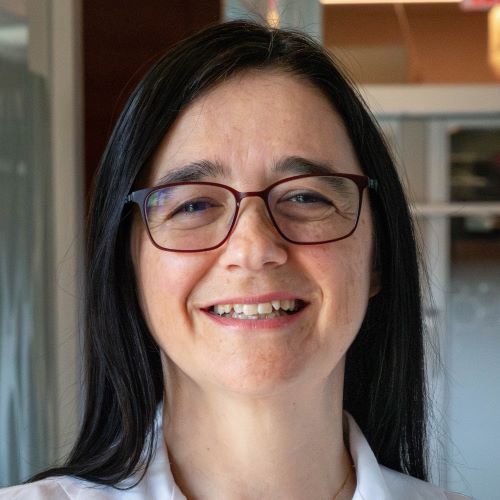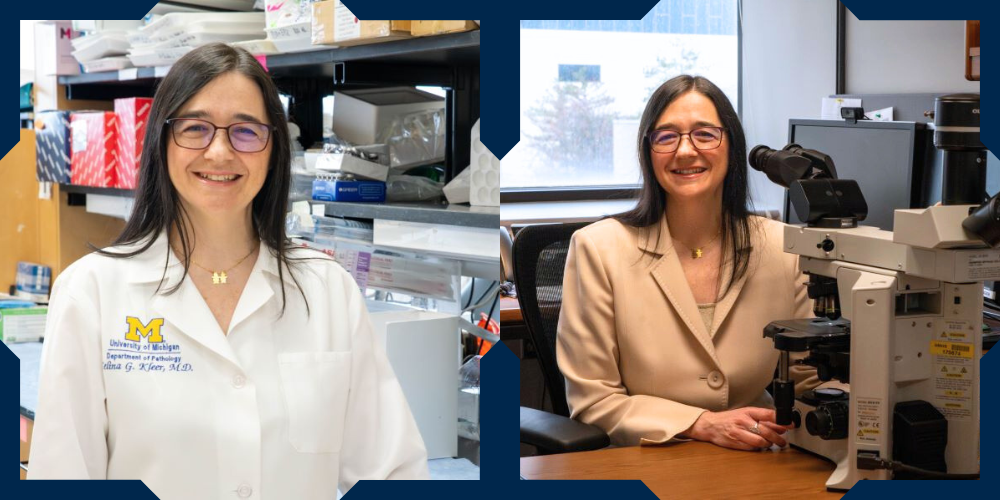

C
 ongratulations to Celina Kleer, MD, the Harold A. Oberman Collegiate Professor of Pathology and Director of Breast Pathology Research, on her election to the prestigious Association of American Physicians (AAP). The AAP is an honorary society dedicated to the advancement of scientific and practical medicine and admits only 70 new members to its rank each year. Election is highly selective and as described on their website, is “an honor extended to physicians with outstanding credentials in basic or translational biomedical research.” Kleer will be formally inducted into the AAP at their Annual Meeting in Chicago next month.
ongratulations to Celina Kleer, MD, the Harold A. Oberman Collegiate Professor of Pathology and Director of Breast Pathology Research, on her election to the prestigious Association of American Physicians (AAP). The AAP is an honorary society dedicated to the advancement of scientific and practical medicine and admits only 70 new members to its rank each year. Election is highly selective and as described on their website, is “an honor extended to physicians with outstanding credentials in basic or translational biomedical research.” Kleer will be formally inducted into the AAP at their Annual Meeting in Chicago next month.
Kleer was nominated primarily by Kathleen Cho, MD, Professor of Pathology and Internal Medicine, Peter A. Ward Professor of Pathology, Vice Chair for Academic Affairs, and Director of Gynecologic Pathology at the University of Michigan Department of Pathology and additionally by Kornelia Polyak, MD, PhD, from Dana-Farber Cancer Institute and Harvard Medical School.
“Celina Kleer is an internationally recognized physician-scientist and surgical pathologist working at the leading edge of translational breast cancer research. She has made a number of fundamental discoveries on the causation of breast cancer and has leveraged her knowledge of breast cancer pathology for biomarker discovery and developed them as clinically useful tissue biomarkers and targets for novel treatment strategies” praised Cho. Among these discoveries, Kleer identified the role of EZH2 as an oncogene and prognostic biomarker in breast cancer in 2003. Subsequently, her laboratory identified new mechanisms of EZH2 function. In particular, they showed that EZH2’s regulation by T367 phosphorylation led to cytoplasmic localization of EZH2 and PRC2 to enhance breast cancer metastasis. This study demonstrated a previously unknown mechanism of EZH2 oncogenicity in breast. EZH2 and its downstream pathways are now targets of new therapies in solid tumors.
Polyak added, “Dr. Kleer is an outstanding breast pathologist with an intimately linked passion for both research and for patient care. She is renowned for her work on EZH2 in breast cancer as well as for dissecting mechanisms of tumor progression and developing clinically useful biomarkers for patient stratification.”
 Kleer also discovered the tumor suppressor CCN6/WISP3 in metaplastic breast carcinomas, one the most aggressive forms of breast cancer. She went on to develop the only mouse model to date of spindle metaplastic breast carcinomas based on conditional mammary epithelial-specific deletion of CCN6. “This model is enabling work to better understand the molecular determinants of this disease,” added Cho. “It is providing a robust platform for testing new treatments for metaplastic breast carcinomas.”
Kleer also discovered the tumor suppressor CCN6/WISP3 in metaplastic breast carcinomas, one the most aggressive forms of breast cancer. She went on to develop the only mouse model to date of spindle metaplastic breast carcinomas based on conditional mammary epithelial-specific deletion of CCN6. “This model is enabling work to better understand the molecular determinants of this disease,” added Cho. “It is providing a robust platform for testing new treatments for metaplastic breast carcinomas.”
Over the past 25 years in research, Kleer has forged her own path. “The research from my laboratory has enhanced the understanding of the intrinsic mechanisms of breast cancer development and progression.” Kleer credits her pathology background for providing her with in-depth understanding of disease. “As pathologists, we look at thousands of cases of breast cancer and appreciate the nuances of the disease. This is extremely valuable in the quest to understand the basic mechanisms of breast carcinogenesis.”
“I am honored to be elected to the AAP,” said Kleer. “It recognizes the special career trajectory of physician scientists. The society was founded in 1885 by Sir William Osler and Dr. Francis Delafield to acknowledge the role of physicians who advance science.” Being elected to the AAP is a testament to Kleer’s accomplishments and dedication to further research in breast cancer, a disease that takes the lives of so many patients. “As a member of the AAP I will have the opportunity to network with other physician scientists and form collaborations to explore novel ideas. It will also provide me further opportunities to impact the careers of a new generation of physician scientists,” said Kleer.
Kleer is a role model for aspiring physician scientists and has trained many in her laboratory. Kleer appreciates Cho’s support over the years. “She has been an exceptional role model and colleague of whom I have often asked for advice throughout my tenure. She cares deeply about the faculty in our department and their professional and personal development.”